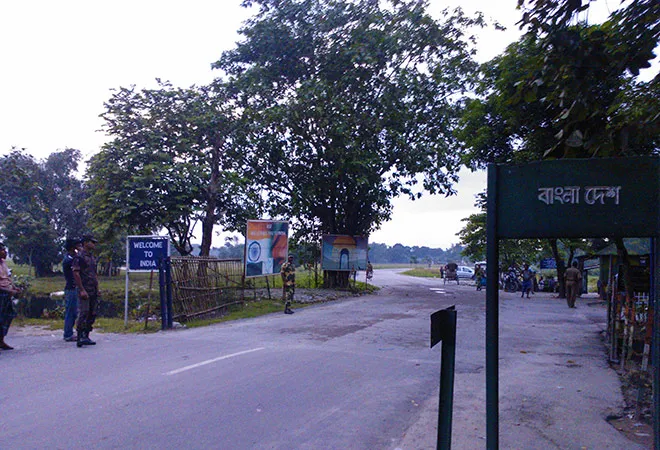The death of Border Security Force (BSF) personnel in an incident of firing by Border Guards Bangladesh (BGB) highlighted the vulnerabilities in the India and Bangladesh border. The incident took place in the riverine border in West Bengal.
The BSF officials had gone to Bangladesh for a flag meeting to discuss the release of the Indian fishermen arrested by the BGB while fishing in the river Padma, a common river shared by the two countries. BGB claimed the fishermen were arrested because of fishing in Bangladesh’s territory, where a ban on fishing has been imposed for 22 days by the government of that country. BSF, in its statements, accused BGB of highhandedness during the flag meeting that resulted in the firing. BGB, contrarily, claimed they opened fire in self-defence.
BSF-BGB tension is an aberration
Considering the warm relationship India and Bangladesh share, the incident came as a major shock. The India and Bangladesh border has been largely peaceful, and no such incident had taken place in decades. Hence, the incident is being considered as an aberration. The two countries have ordered separate investigations to unearth the reasons behind it. Nevertheless, the incident precipitated the urgency to develop a much deeper understanding of the border and its complexities, to avoid such actions in the future.
The need to be watchful of these incidences arises largely because aberrations can trigger changes, that can undo all the gains that have been achieved until now.
India and Bangladesh share a 4096-kilometre-long border, one of the longest borders in the world. The border, a legacy of the common colonial past, lacks natural division. India and Bangladesh were separated following the partition of India in 1947. The border runs through complex topography including hills, rivers, agricultural lands, populated towns and villages. The diversity of the border makes it a porous one, thus, posing a challenge to border management.
Besides, people of the same ethnicity and language having social and familial links live across the border, who regularly cross over to each other’s territory without valid travel documents. The transnational crime syndicates take advantage of this feature of the border (to carry out various clandestine activities) across. The India-Bangladesh border, thus, is prone to transnational crimes like human trafficking, smuggling of contraband substances, counterfeit money, arms, cattle etc.
Border norms may antagonise common folk across borders
The two countries have implemented a strict border control policy to secure the border. They have undertaken various measures for the guarding, regulating and monitoring of the border. For guarding, border security guards are deployed at the border; to regulate and monitor — specific entry and exit points have been designated to watch movements of the people and goods. Further, India unilaterally erected a barbed wire fence within the 150 metres inside the boundary, to enhance border security.
These barriers often cause a feeling of antagonism among the people of the borderlands as they find obstacles to their natural way of life.
The population in these borderlands are yet to recalibrate their understanding of the new divisions of their lands and rivers, which they have thought to be theirs for generations. There is a need to understand the social and economic interlinkages that existed before partition of India that have remained till this day. The realities of the changing times, however, pressurised the two countries into bringing in certain measures necessary to maintain peace and security of the communities at large. These barriers have played a substantial role in controlling various cross-border criminal activities.
These systems are not always full-proof, and mishaps occur which can instigate a feeling of antagonism towards the country across. A glaring example has been death in the border, a point of contention between Indian and Bangladesh. Bangladesh often complains about the killing of its citizens by the Indian border guards. Mostly, people killed on the border are claimed in Bangladesh to be cattle-traders, while India accuses them of being smugglers, because the export of cattle is banned according to the law of India.
Also, there have been instances of Indian BSF personnel being killed by Bangladesh’s border guarding force in 2001. Such incidents arise due to limited understanding of border management, which concentrates on militaristic solutions only. For effective management of the India-Bangladesh border, historical realities of the borderland have to be accounted for.
Dialogue between BSF & BGB chiefs will go a long way
Of late, India and Bangladesh have shown interest in exploring new alternatives to their border management. In this respect, the resolution of the land boundary is a landmark. Besides, a multi-layered institutional mechanism for dialogue among the border personnel has been formalised. The chiefs of BSF and BGB regularly meet to discuss various issues regarding the border. These dialogues have been fruitful in expressing each other’s concerns. India’s unilateral decision to use a non-lethal weapon that helped to reduce the number of border deaths has been an outcome of such dialogue. Additionally, the establishment of border-haats is reflective of the intention of the authorities to experiment with alternatives pathways for managing the India and Bangladesh border.
Considering the existing bonhomie between India and Bangladesh, a border free of bloodstains is desirable.
The recent incident suggests a need to rethink the dialogue processes among the border guarding forces. Emphasis must be made on ensuring that the dialogues at the ground-level are arms-free.
This commentary originally appeared in The Quint.
The views expressed above belong to the author(s). ORF research and analyses now available on Telegram! Click here to access our curated content — blogs, longforms and interviews.




 PREV
PREV


